Voici vos #Édubrèves. N’hésitez pas à les partager ou à m’écrire si vous avez des nouvelles à faire circuler.
Dans cette édition : L’évaluation à l’école fait jaser ces temps-ci, les bourses de perfectionnement de l’AQUOPS, le quiz vidéo maintenant disponible dans BookWidgets, des suggestions de balados à écouter et d’événements à mettre à votre agenda, le Laboratoire en innovation ouverte veut entendre des parents, des enseignants et des élèves, devenir contributeur du Mois Numérique Jeunesse, un nouveau programme de réparation et service en électronique et bien plus!
Bonne lecture.

Attention, l’usage de GIF animés dans ce condensé de nouvelles brèves est à des fins de divertissement seulement.
L’évaluation à l’école fait jaser ces temps-ci
Voici quelques publications et événements qui ont retenu notre attention à ce sujet.
Midi inspirant : Au revoir les notes à l’école!
Pourquoi, comment et quand éliminer les notes chiffrées de vos évaluations? À quoi ressemble une école qui se lance dans l’évaluation sans notes chiffrées? Pour répondre à ces questions, l’Association Edteq reçoit Catherine Michaud, enseignante de mathématiques au secondaire et fondatrice de l’application IBI, qui aide les profs à impliquer les élèves dans l’évaluation intégrée et conjointe sans notes chiffrées, ainsi que Marie-Hélène Simard, enseignante de sciences et de mathématiques au secondaire, qui supervise la transition vers l’évaluation sans notes chiffrées au Collège Sainte-Anne de Dorval.
- Vendredi le 20 janvier, de 12 h à 13h
- Conférence en ligne gratuite et ouverte à tous.
- Pour s’inscire en suivant le lien Zoom.
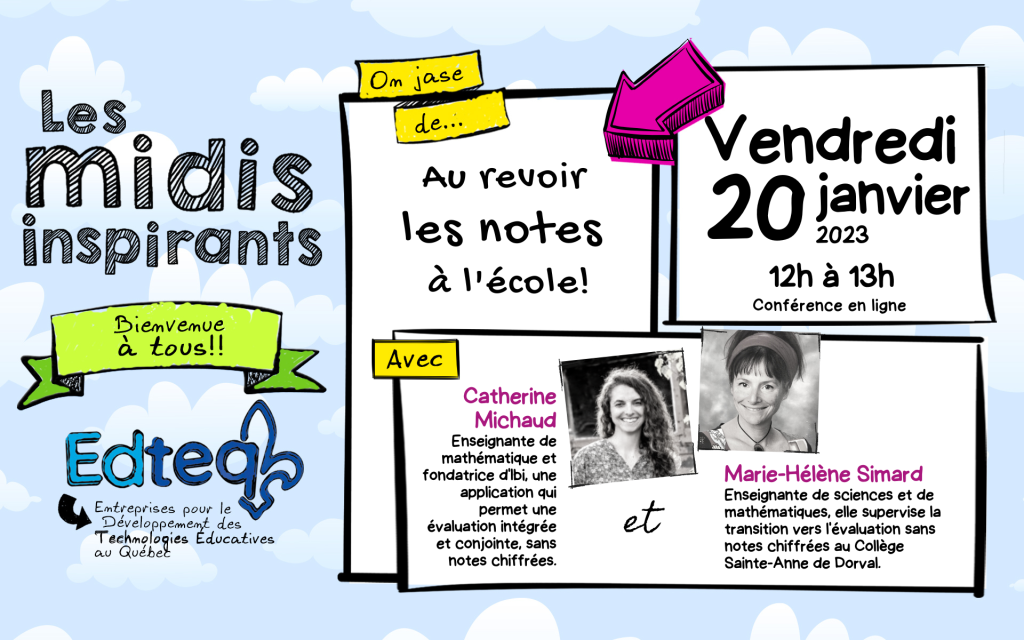
À lire
- Bulletin scolaire: qualifier plutôt que quantifier : un texte d’opinion de Sébastien Gallant, enseignant au secondaire, étudiant à la maîtrise en efficacité de l’enseignement et des écoles, Terrebonne, publié dans le Journal de Québec.
- Révolution dans les évaluations: une école dit adieu aux notes chiffrées : L’école primaire Henri-Beaulieu, située dans l’arrondissement Saint-Laurent à Montréal, a mis au rancart les résultats chiffrés pour ses élèves du début du primaire.
- L’éducation, un terrain de jeu prisé pour les gérants d’estrade : Nancy Goyette, professeure au Département des sciences de l’éducation de l’Université du Québec à Trois-Rivières, répond au chroniqueur Mathieu Bock-Côté qui souhaite le maintien des notes chiffrés à l’école.
À écouter
- L’épisode du lundi 16 janvier de l’émission Marie-Claude à TVA : avec le psychologue Edige Royer et l’enseignant Pierre Poulin, qui sera présent lors du Club de lecture de l’École branchée du 18 janvier.
- Un épisode du balado Tous les profs en parlent consacré à l’éléphant dans la pièce : l’évaluation. Les animatrices et fondatrices de Zelexio discutent ensemble du sujet en partageant leurs expériences, leurs observations et leurs opinions.
Bourses de perfectionnement de l’AQUOPS
Voici une nouvelle occasion d’obtenir du soutien financier pour vos projets de perfectionnement et de formation. Vous avez un projet de perfectionnement ou vous souhaitez suivre une formation en intégration pédagogique du numérique? Déposez votre projet dès maintenant à l’équipe de l’AQUOPS. Vous pourriez recevoir une bourse pour vous aider à réaliser votre projet de formation.
Psstt. Vous pourriez financer l’organisation d’une formation CréaCamp de l’École branchée dans votre école!
- Date limite : 25 janvier 2023
- Critères d’admissibilité
- Formulaire
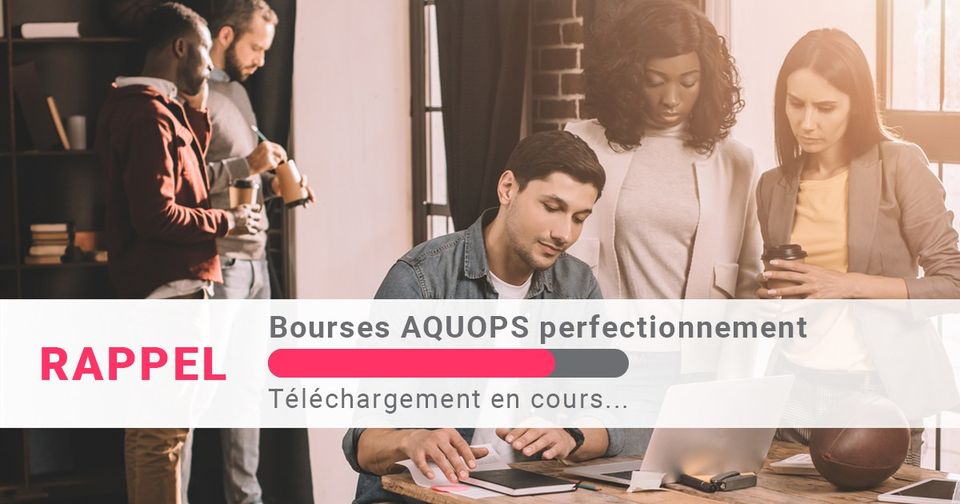
Une nouveauté dans BookWidgets : le quiz vidéo
L’éditeur de l’application BookWidgets annonce une belle nouveauté. Avec le quiz vidéo, les enseignants peuvent insérer des questions dans une vidéo à différents moments. Commencez par une vidéo YouTube, choisissez les différents moments où vous voulez interrompre la vidéo, et utilisez BookWidgets pour insérer plus de 35 types de questions, rendant la vidéo instantanément interactive. Consulter un exemple amusant.
Découvrez le fonctionnement du Quiz Vidéo dans ce tutoriel :
Dimitri Bongers de BookWidgets a offert une formation CréaCamp Découverte en novembre 2022. Sa rediffusion vous est offerte par Bookwidgets.
L’utilisation de l’intelligence artificielle (IA) en classe
Sujet qui fait grandement réagir depuis quelques semaines, l’IA en éducation devra être apprivoisée au cours de la prochaine année. Voici un Genially de Damien Dubreuil qui présente l’outil Chat GPT, 10 exemples d’utilisation de l’IA en classe et des ressources utiles. Il s’agit d’une synthèse des notes de Yann Houry (lycée international Winston-Churchill) et Grégoire Aribaut (Université de Montréal et Université de l’Ontario français). Merci au CADRE21 pour le partage dans leur infolettre.

Balado Tout le monde est un leader, saison 3
C’est le retour du balado Tout le monde est un leader pour une 3e saison, à compter du 21 janvier 2023. Tous les samedis matin, un nouvel épisode sera publié à 7 h. Si vous n’avez pas eu la chance de découvrir les deux premières saisons de ce balado, les 50 premiers épisodes sont déjà disponibles ici : https://escouadeedu.ca/podcast/. De quoi occuper quelques soirées!
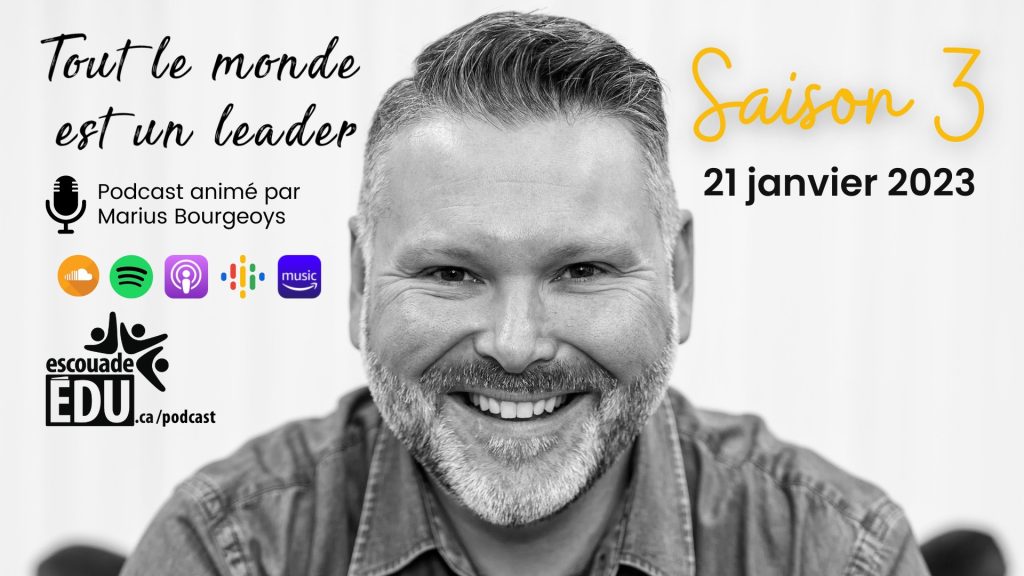
À lire en vrac
- Et si l’école québécoise devenait un véritable milieu de vie : Dans ce texte, publié dans La Presse, Joël Boucher, ex-enseignant et directeur d’école, s’intéressé au système d’éducation finlandais, qui propose une approche différente de l’école québécoise. Il s’agit du troisième texte d’une série. Vous trouverez les liens vers les deux textes précédents.
- La foucade est le journal officiel du Comité québécois pour les jeunes en difficulté de comportement (CQJDC). Consultez la plus récente édition de la revue.
- Près du tiers des élèves québécois sont issu de l’immigration, de première ou de deuxième génération. Dans ce contexte de diversité croissante, le rôle de l’école dans la prise en compte de la diversité ethnoculturelle, linguistique et religieuse est central. Un article du Réseau d’information en réussite éducative.
- Être chef d’école : Un reportage ultra-complet de Marc Tisson, publié dans La Presse. « Ils dirigent des centaines de personnes, ils gèrent des millions en budget et équipement, leurs établissements produisent ce qu’il y a de plus précieux pour notre société… Chefs d’entreprise ? Patrons de PME ? Non, directeurs et directrices d’école. »
Votez pour le coup de cœur du concours Dans ma lentille
Le projet Dans ma lentille a été réalisé en collaboration entre la Bibliothèque de Québec et ICI Québec. Quatorze adolescentes et des adolescents de 14 à 17 ans ont suivi, pendant huit semaines, des ateliers pour apprendre à faire de la production vidéo. Sur le site du projet, vous pouvez visionner la vidéo en bas de page pour en apprendre davantage.
Quatre productions sont aussi présentées sur le site. À vous maintenant de voter pour votre vidéo coup de cœur.

À mettre à l’agenda
- Le prochain colloque sur la douance du Centre de services scolaire Marguerite-Bourgeoys aura lieu en ligne le 1er décembre 2023. Détails à venir.
- Le 48e Congrès annuel en ligne de l’Institut TA aura lieu les 22, 23 et 24 mars 2023 sous le thème Essentiel pour les uns, bon pour tous. Pour en savoir plus
- Le 20 janvier prochain, de 10 h à 12 h, vous êtes invités à assister virtuellement à la présentation des résultats de deux recherches financées par le Programme de recherche en littératie sur les récits joués par les enfants de maternelle et les cercles de lecteurs au primaire. L’inscription est gratuite, mais obligatoire.
À écouter en vrac
- Marc-André Smith, directeur du Centre de formation professionnelle Gabriel-Rousseau, présente un nouveau programme de réparation et service en électronique qui y voit le jour ces jours-ci. Un reportage de Radio-Canada.
- Le balado Humaniteq porte sur l’humanité & les nouvelles technologies La Série 3 – IA & Diversité vient d’être lancée. Les 4 épisodes abordent des sujets centraux de la diversité : femmes, diversité ethno culturelle, cultures autochtones et neurodiversité.
En rappel : Appel à participation pour le Mois Numérique Jeunesse (MNJ)
Le Mois Numérique Jeunesse (MNJ) est de retour pour une 4e édition du 1er février au 5 mars 2023. Ce rendez-vous annuel des moins de 35 ans permet de découvrir les initiatives québécoises en littératie numérique et de s’informer sur les domaines d’avenir. L’objectif est aussi d’offrir une vitrine à vos ressources numériques et vos activités qui ont lieu durant le mois de février et/ou la semaine de relâche scolaire!
Il est toujours tant de participer en tant que collaborateur de ce mouvement collectif en inscrivant une ou des activités qui auont lieu, au moins en partie, durant le MNJ, et/ou des ressources numériques sur la plateforme MNJ.QUEBEC.
En 2023, pour sensibiliser les jeunes à un enjeu de citoyenneté à l’ère du numérique qui les touche particulièrement, le MNJ abordera thématique principale : « la vie privée ».
(Re)lire l’appel à participation.
Du côté de l’École branchée, Laurie Couture présentera gratuitement la conférence « Quand l’intelligence s’amuse » : Développer une compétence à coup de créativité, le 16 février de midi à 13h.
Consultez les détails de l’événement sur Facebook.
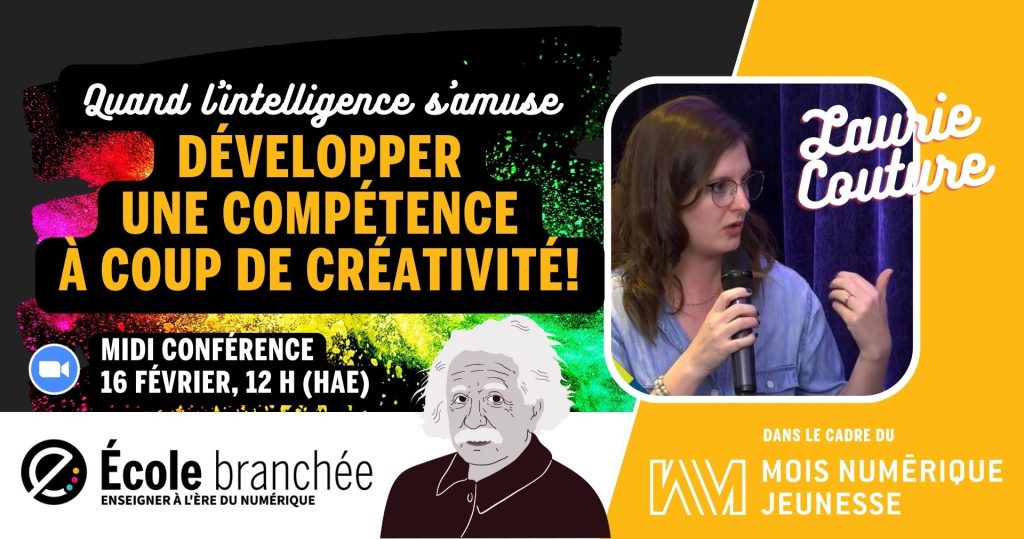
Parents, enseignants et élèves recherchés
Le CTREQ collabore avec Le laboratoire en innovation ouverte (LLio) afin de contribuer à la réduction des inégalités numériques, et ce, en misant sur la collaboration entre chercheurs et acteurs du milieu de l’éducation primaire et secondaire tels que : établissements scolaires publics et privés, centres de services scolaires, conseillers pédagogiques, organismes, ministère et entreprises privées.
Pour ce projet, le LLio, en partenariat avec l’Université du Québec à Rimouski, est à la recherche de personnes souhaitant s’impliquer dans les neuf rencontres de cocréation en présence et à distance qui auront lieu de janvier à mai 2023. Une occasion unique pour vivre une démarche de cocréation et expérimenter des outils de travail collaboratif au profit des élèves!
Pour plus d’informations, consultez le site web du projet ou contactez les responsables à l’adresse lavie@llio.quebec.
Consultez les détails de l’avis de recherche.

Appel à communications – Colloque Tout-petits, enfants et adolescents dans l’environnement numérique : enjeux pour les familles, le monde de l’éducation et la sphère politique
L’équipe d’organisation de ce colloque qui se tiendra lors du 90e congrès de l’ACFAS, du 10 au 12 mai 2023 est à la recherche de contributeur pour venir présenter des recherches, des expérimentations ou des idées de projets dans le domaine de l’éducation au numérique auprès des tout-petits, des enfants ou des adolescents. Date limite de soumission : 13 février 2023.
101 projets scolaires dans les 17 régions du Québec seront soutenus par la Fondation Monique-Fitz-Back
La Fondation Monique-Fitz-Back a annoncé la semaine dernière que 101 projets scolaires seront soutenus dans le cadre de l’édition 2022-2023 de son programme d’aide financière. Répartis à travers les 17 régions administratives de la province, ces projets impliqueront directement 20 402 jeunes, de la petite enfance jusqu’au cégep, incluant la formation aux adultes. La valeur totale des subventions attribuées pour 2022-2023 s’élève à 100 900 $. Les montants octroyés à chaque projet varient entre 200 $ et 2 000 $, selon le volet dans lequel le projet sera réalisé et les besoins financiers pour y parvenir.
Tous les projets retenus peuvent être consultés sur cette page du site de l’organisme en choisissant les filtres souhaités : par niveau, par région, par volet.
Tous les projets retenus ont en commun la sensibilisation et la mobilisation des jeunes dans toutes les étapes du projet, en plus d’encourager leur implication active dans l’atteinte des objectifs visés par chaque volet. Une attention toute particulière a également été portée aux projets dont les finalités visent à provoquer des changements de comportement positifs chez les jeunes et dans leur milieu.
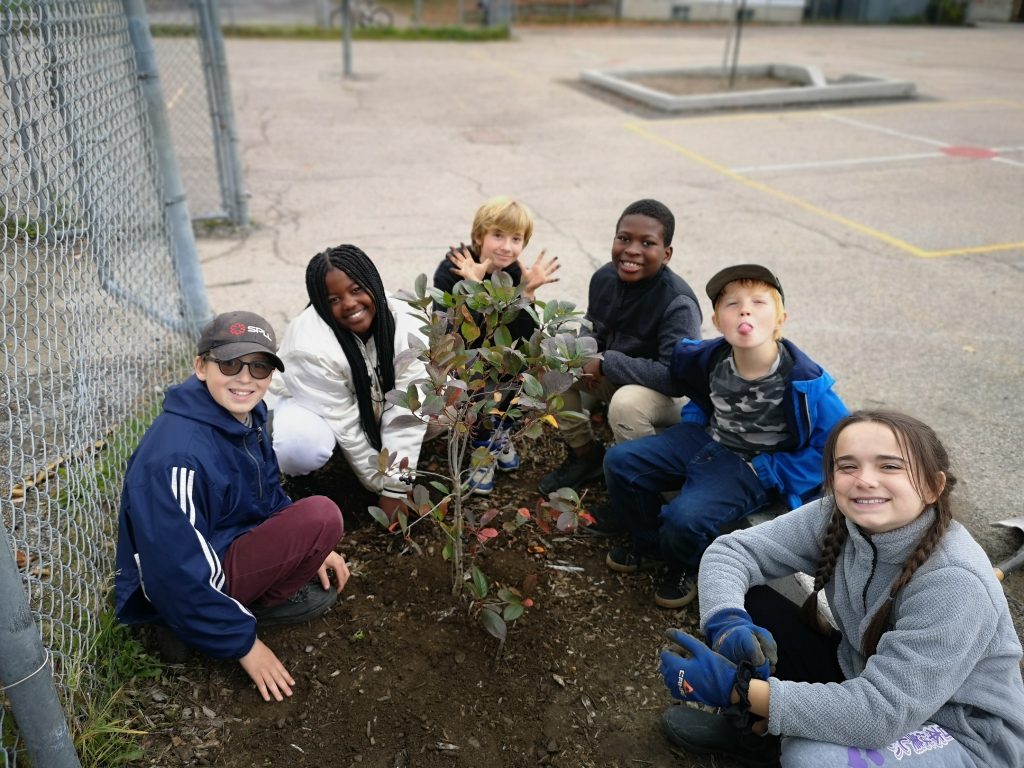
En terminant, voici trois astuces pour mettre fin à la procrastination numérique
Ils sont simples, mais on a parfois tendance à les oublier.
- Astuce 1: Aménager son environnement de travail.
- Astuce 2: Instaurer des temps de pause.
- Astuce 3: Contrôler les périodes d’échanges.

Si vous en voulez encore plus, vous pouvez (re)voir les #Édubrèves de la semaine dernière.
On se retrouve bientôt! N’hésitez pas d’ici là à nous « tagguer » (en bon français…) sur Twitter (@millaudrey ou @riomarti) pour que nous parlions de votre projet/ressource dans une prochaine revue de la semaine! Passez une excellente semaine.




 Recevez l'Info #DevProf et l'Hebdo pour ne rien manquer des nouveautés de l'École branchée!
Recevez l'Info #DevProf et l'Hebdo pour ne rien manquer des nouveautés de l'École branchée!




